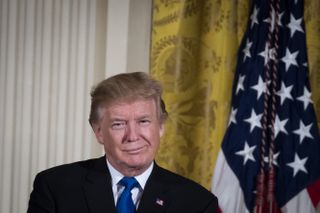The real reason Trump and Barr are trying to shame Apple
The FBI doesn't need Apple's help to access locked iPhones, but it does want the company to create a universal backdoor.

It seems that Apple’s engineers are probably not going to decrypt the Pensacola terrorist's iPhones. And why should they? The FBI can almost certainly already do this with tools at its disposal. So why ask for Apple's help and go on a public campaign to shame Cook & Co.?
Perhaps the reason is that the FBI wants something else instead — easy access to any phone, including yours. In other words, the long-demanded government backdoor.
The fact is that, no matter what President Trump or Attorney General William Barr say, there’s absolutely no reason to ask Apple to open the Pensacola terrorist’s old iPhones. That’s easy to do with a special device. In fact, we just have learned that the FBI appear to even be able to access the latest iPhone 11 Pro Max, which is allegedly Apple’s most secure phone ever.
GrayKey unlocks iPhone 11, so...
As Forbes reports, “FBI investigators in Ohio used a hacking device called a GrayKey to draw data from the latest Apple model, the iPhone 11 Pro Max.“ Apparently, the phone was used by someone “accused of helping his convicted brother flee the country.”
(The search warrant says the device is an nonexistent "iPhone 12.5," but the serial number listed belongs to an iPhone 11 Pro Max, and the warrant application to unlock the phone includes a photo of a locked but powered 11 Pro Max.)
We already knew that GrayKey can break into old iPhones (a 5 and a 7) like the ones used by the 21-year-old terrorist who recently killed three sailors at the Pensacola Air Force base in Florida. It takes some time, but it can be done.
However, despite having access to GrayKey, the FBI asked Apple to open the phones for them anyway. The FBI did this knowing that, once again, Apple was going to say no. There’s a long history of Apple saying no to the FBI and other agencies.
Then Barr tried to shame the company in a press conference to apparently force its hand, implying that Apple was almost actively aiding criminals with its stance about privacy and encryption. Even Trump joined that effort in one of his tweets.
Following that, President Trump issued a tweet demanding that Apple "step up to the plate and help our great Country."
But again, knowing there are tools available to the FBI to do exactly what the agency is asking for, it may seem that all this ruckus is not about access to these particular phones, but about a larger point.
We are helping Apple all of the time on TRADE and so many other issues, and yet they refuse to unlock phones used by killers, drug dealers and other violent criminal elements. They will have to step up to the plate and help our great Country, NOW! MAKE AMERICA GREAT AGAIN.January 14, 2020
It's all about the backdoor

It all makes sense when you look at Apple’s past confrontation with the US government. The company has repeatedly declined to go on fishing expeditions with the FBI and claims that it will not betray its plea to its customers’ privacy by granting access to its phones — even while it offers a law enforcement support program to help when it is justified.
“We believe security shouldn’t come at the expense of individual privacy,” Apple says on its official page about the matter, which predates this most recent case. Here’s what the company has to say:
“Apple receives various forms of legal process requesting information from or actions by Apple. Apple requires government and private entities to follow applicable laws and statutes when requesting customer information and data [...] Our legal team reviews requests to ensure that the requests have a valid legal basis. If they do, we comply by providing data responsive to the request. If a request does not have a valid legal basis, or if we consider it to be unclear, inappropriate, or overly broad, we challenge or reject the request. We report on the requests every six months.”
But the most important part, and what really bugs Barr and the feds, is what comes next:
“Apple has never created a backdoor or master key to any of our products or services. We have also never allowed any government direct access to Apple servers. And we never will.”
The slippery slope of stripping rights
That’s really what this is all about — not the Pensacola phones that will be cracked wide open with GrayKey. You only have to see what Barr said latter in that press conference: "We call on Apple and other technology companies to help us find a solution so that we can better protect the lives of Americans and prevent future attacks.”
Actually, this is why we have court orders and due process in the United States and other civilized countries. And yes, of course, there is a need for security, but security can‘t be a ”carte blanche” to abusive policies that range from forcing you to take off your shoes at the airport to forcing you to unlock your phone for no reason at the US border (which has already been declared illegal) to “stop and frisk”.
The fact is that security — or better said, the illusion of security, because none of these policies have demonstrated any effectiveness — can’t be “guaranteed” by stripping all of us from our most basic rights in the US or anywhere else.
Sign up to get the BEST of Tom’s Guide direct to your inbox.
Upgrade your life with a daily dose of the biggest tech news, lifestyle hacks and our curated analysis. Be the first to know about cutting-edge gadgets and the hottest deals.
Jesus Diaz founded the new Sploid for Gawker Media after seven years working at Gizmodo, where he helmed the lost-in-a-bar iPhone 4 story and wrote old angry man rants, among other things. He's a creative director, screenwriter, and producer at The Magic Sauce, and currently writes for Fast Company and Tom's Guide.

